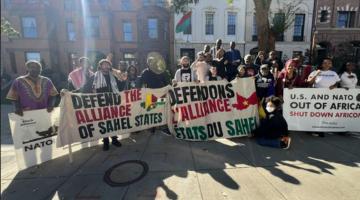Authors of a new report worry that Washington won’t heed their warnings but double down in an era of Great Power Competition.
Originally published in Responsible Statecraft.
The recent series of military coups across the Sahelian region should prompt a major reassessment of U.S. military and security assistance to fragile African states, according to a new report by the Chicago Council on Global Affairs that calls for a much greater focus on improving governance.
“Military action might suppress the problem of terrorism, but it will not relieve the underlying conditions that feed it,” according to the report. “Only improved governance can address these grievances, which means good governance is the foundation for long-term stability.”
“It’s time to flip the script,” argue the report’s authors. “US policy in Africa has for too long prioritized short-term security to the detriment of long-term stability by prioritizing the provision of military security assistance. Yet this strategy has neither produced security in Africa nor reduced threats to the United States and its interests.”
Among other recommendations, the 67-page report, entitled, “Less is More: A New Strategy for US Security Assistance to Africa,” which includes several case studies, calls for “rein[ing] in its use of security assistance with partners that fail to demonstrate commitment to the reforms necessary to build long-term stability.” And it worries that the new paradigm of “great-power competition” between the U.S. and Russia or China could result in even greater reliance on military assistance.
“The rise of great-power competition exacerbates the risk that the US national security establishment will double down on its security cooperation strategy in the region out of concern that doing otherwise would leave a vacuum that America’s competitors might fill,” according to the report. “In reality, however, the argument for being more selective in distributing security assistance is even stronger with the return of great-power competition, as values and reputation become increasingly important in attracting support for the United States over other great powers.”
The report, authored by Elizabeth Shackelford, Ethan Kessler, and Emma Sanderson, comes on the heels of a military coup against a democratically elected president who had cooperated particularly closely with both Paris and Washington in counterterrorism and counterinsurgency efforts both in Niger and the wider Sahelian and West African regions. Niger, which has hosted a drone base staffed by some 1100 U.S. soldiers, has received about $500 million in U.S. security and military assistance since 2016.
The coup marked the sixth across the two regions since 2020. Officers who have received at least some U.S. training in the past three years have played key roles in coups in Mali (2020), Guinea (2021), Chad (2021), Burkina Faso (2022), and now Niger. While U.S. training ordinarily includes courses on human rights and respect for civilian rule, the record suggests that these efforts have had limited impact at best.
“Rather than presume that security assistance will enhance stability and increase our influence, the U.S. government should recognize that security assistance in the hands of weak, fragile, or illiberal states is innately risky,” according to the report. “Accordingly, it should use security assistance sparingly and only after assessing that the benefits, should they be attainable, are likely to outweigh the long-term costs.”
The report presents specific country case studies covering Burkina Faso, Cameroon, and Ethiopia. It said in all three countries, “security sector assistance failed to prevent or end the terrorist threat that US assistance was meant to combat, facilitated abusive behavior by the partner country’s military, and ultimately contributed to greater instability in the long term.”
Among other recommendations, the report urges more robust vetting and oversight by the State Department of military units of recipient countries and the tracking and reporting by the U.S. intelligence community of human rights abuses committed by recipient military and security forces to advise other U.S. agencies and provide early warning of destabilizing behavior that can lead to conflict.
All new or planned security assistance programs, it said, should be subject to a “full and systematic risk assessment …to consider potential impact on long-term US interests, such as governance issues that impact political stability, including anti-democratic tendencies, ethnic conflict exacerbation, inequality of resource distribution and government services and accountability of the security services.”
It also calls for much greater and more aggressive Congressional oversight of U.S. security assistance programs and the closing of loopholes in the so-called Leahy laws that ban assistance to abusive units.
In addition to giving greater priority to non-military assistance and “soft-power engagement, Washington should also channel more security assistance through regional bodies, such as the Economic Community of West African States instead of direct country support where the leadership is weak and protection for civilians is questionable.”
Jim Lobe is a Senior Advisor and contributing editor at Responsible Statecraft. Previously, he served as chief of the Washington bureau of Inter Press Service from 1980 to 1985 and again from 1989 to 2016. Best known for his coverage of the neoconservative movement’s influence on U.S. foreign policy, he directed LobeLog.com, which focused primarily on U.S. Middle East policy, from 2007 to 2020.



















